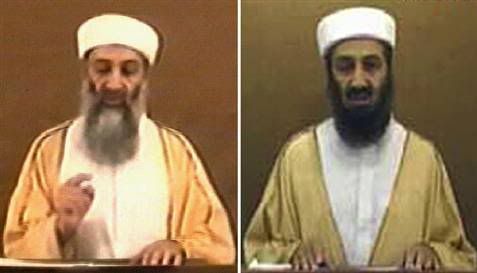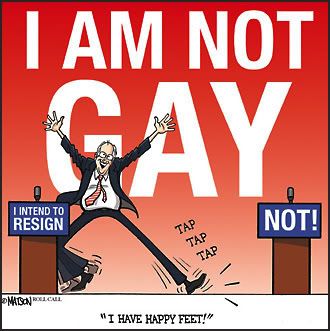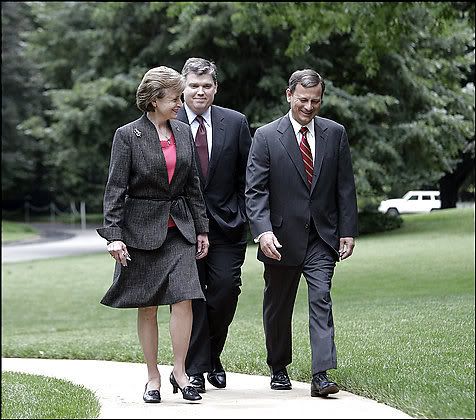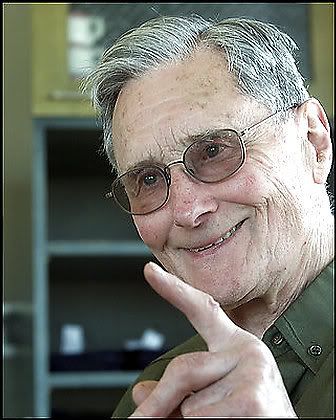Bush Puts Iran in CrosshairsNot another warning about war with Iran! Well, suck it up. President George W. Bush’s speech Tuesday makes clear his plan to attack Iran, and how the intelligence, as was the case before the attack on Iraq, is being “fixed around the policy.”
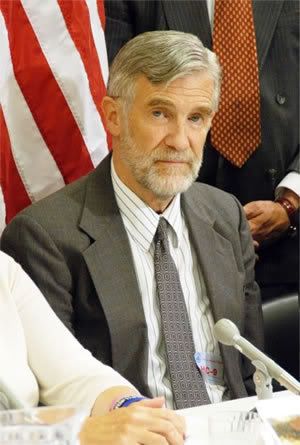
At
ConsortiumNews.com,
Ray McGovern writes:
It’s not about putative Iranian “weapons of mass destruction” — not even ostensibly. It is about the requirement for a scapegoat for U.S. reverses in Iraq, and the felt need to create a casus belli by provoking Iran in such a way as to “justify” armed retaliation — perhaps extending to an attempt to destroy its nuclear-related facilities.
Bush’s Aug. 28 speech to the American Legion came five years after a very similar presentation by Vice President Dick Cheney. Addressing the Veterans of Foreign Wars on Aug. 26, 2002, Cheney set the meretricious terms of reference for war on Iraq.
Sitting on the same stage that evening was former CENTCOM commander Marine Gen. Anthony Zinni, who was being honored at the VFW convention. Zinni later said he was shocked to hear a depiction of intelligence (Iraq has WMD and is amassing them to use against us) that did not square with what he knew. Although Zinni had retired two years before, his role as consultant had enabled him to stay up to date on key intelligence findings.
“There was no solid proof that Saddam had WMD...I heard a case being made to go to war,” Zinni told Meet the Press three and a half years later.
(Zinni is a straight shooter with considerable courage, and so the question lingers: why did he not go public? It is all too familiar a conundrum at senior levels and, almost always, the result comes out badly. It is a safe bet he regrets letting himself be guided by a misguided professional courtesy and/or slavish adherence to classification restrictions, when he might have prevented our country from starting the kind of war of aggression branded at Nuremberg as the “supreme international crime.”)
Zinni was not the only one taken aback by Cheney’s words. Then-CIA Director George Tenet says Cheney’s speech took him completely by surprise. In his memoir, Tenet wrote, “I had the impression that the president wasn’t any more aware than we were of what his number-two was going to say to the VFW until he said it.”
Yet, it could have been anticipated. Just five weeks before, Tenet himself had told his British counterpart that the president had decided to make war on Iraq for regime change and that “the intelligence and facts were being fixed around the policy.”
When Bush’s senior advisers came back to town after Labor Day, 2002, the next five weeks were devoted to selling the war, a major “new product” of the kind that, as then-White House chief of staff Andy Card explained, no one would introduce in the month of August.
After assuring themselves that Tenet was a reliable salesman, Cheney and then-Defense Secretary Donald Rumsfeld allowed him to play a supporting role in advertising bogus yellowcake uranium from Niger, aluminum tubes for uranium enrichment, and mobile trailers for manufacturing biological warfare agents, in order to scare Congress into voting for war. It did on Oct. 10 and 11, 2002.
Well, this week, aware or not, it was the president himself who mouthed the “new product”—war with Iran—and, in the process, made clear how “fixed” intelligence is being arrayed to “justify” it.
The case is too clever by half, but the Bush/Cheney team is clearly hoping the product will sell.
Iran’s Nuclear Plans
It has been like waiting for Godot...the endless wait for the latest National Intelligence Estimate on Iran’s nuclear plans.
That NIE turns out to be the quintessential dog that didn’t bark. The most recent published NIE on the subject was issued two-and-a-half years ago and concluded that Iran could not have a nuclear weapon until “early- to mid-next decade.”
That estimate followed a string of NIEs dating back to 1995, which predicted, with embarrassing consistency, that Iran was “within five years” of having a nuclear weapon.
The most recent NIE, published in early 2005, extended the timeline and provided still more margin for error. Basically, the timeline was moved 10 years out to 2015, but a fit of caution yielded the words “early-to-mid next decade.”
On Feb. 27, 2007, at his confirmation hearings to be Director of National Intelligence, Michael McConnell repeated that formulation verbatim.
A “final” draft of the follow-up NIE mentioned above had been completed in February 2007, and McConnell no doubt was briefed on its findings prior to his testimony.
The fact that that this draft has been sent back for revision every other month since February speaks volumes. Judging from McConnell’s testimony based on the NIE draft of February, its judgments are probably not alarmist enough for Vice President Dick Cheney. (Shades of Iraq.)
It is also a safe bet that last December the newly confirmed defense secretary, Robert Gates, was taken to the woodshed by the avuncular Cheney, when Gates suggested to Congress that Iran’s motivation in seeking a nuclear weapon would be deterrence:
“While they [the Iranians] are certainly pressing, in my opinion, for a nuclear capability, I think they would see it in the first instance as a deterrent. They are surrounded by powers with nuclear weapons—Pakistan to the east, the Russians to the north, the Israelis to the west, and us in the Persian Gulf.”
Apparently, the newly minted secretary of defense hadn’t gotten Cheney’s memo.
Unwelcome News (to the White House)
There they go again—those bureaucrats at the International Atomic Energy Agency. On Aug. 28, the very day Bush was playing up the dangers from Iran, the IAEA released a note of understanding between the IAEA and Iran on the key issue of inspection. The IAEA declared:
“The agency has been able to verify the non-diversion of the declared nuclear materials at the enrichment facilities in Iran and has therefore concluded that it remains in peaceful use.”
The IAEA deputy director announced that the plan just agreed to by the IAEA and Iran will enable closure by December on the nuclear issues that the IAEA began investigating in 2003.
Other IAEA officials now express confidence that they will be able to detect any military diversion or any uranium enrichment above a low grade, as long as the Iran-IAEA safeguard agreement remains intact.
Shades of the preliminary findings of the very intrusive U.N. inspections conducted in Iraq in early 2003 before the U.S. warned the U.N. in mid-March to withdraw its inspectors, lest they be shocked-and-awed.
Vice President Cheney can claim, as he did three days before the attack on Iraq, that the IAEA is simply “wrong.” But Cheney’s credibility has sunk to prehistoric levels; witness the fact that the president himself was enlisted to address the Iranian nuclear threat this time around. And he did it with new words.
President’s New Formulation
Did you notice the care that President Bush took to read the exact words of the new formulation on Iran’s nuclear intentions? Not only did he pronounce “nuclear” correctly, he faithfully articulated an altered formula (see below).
The wording suggests to me that the White House has concluded that the “nuclear threat” from Iran is “a dog that won’t hunt,” as Lyndon Johnson might have put it.
The latest news from the IAEA is, for the White House, an extra hurdle. And there is always the possibility that some patriotic truth-teller will make available to the press the judgments of the latest draft NIE on Iran’s nuclear capability.
Or a new Gen. Zinni-type figure might decide to speak out from the Pentagon to head off another unnecessary war.
It is just too much of a stretch to suggest that Iran could be a nuclear threat to the United States within the next 17 months, and that’s all the time Bush and Cheney have got to honor their open pledge to Israel to eliminate Iran’s nuclear potential.
Besides, some American Jewish groups, increasingly concerned over a backlash if young Americans are seen to have been asked to fight and die to eliminate perceived threats to Israel (but not to the U.S.), have been urging the White House to back off the nuclear-threat rationale for war on Iran.
This is how the president put it on Aug. 28:
“Iran’s active pursuit of technology that could lead to nuclear weapons threatens to put a region already known for instability and violence under the shadow of a nuclear holocaust.”
Press reporting has focused on the rhetorical flourish “under the shadow of a nuclear holocaust.” But, in my view, it is the earlier part of the sentence that is most significant.
It is quite a different formulation from earlier Bush rhetoric charging categorically that Iran is “pursuing nuclear weapons,” including this (erroneous) comment at a joint press conference with Afghan President Hamid Karzai in early August:
“This [Iran] is a government that has proclaimed its desire to build a nuclear weapon.”
The (Very) Bad News
Bush and Cheney have clearly decided to use alleged Iranian interference in Iraq as the preferred casus belli. And the charges, whether they have merit or not, have become much more bellicose. Thus, Bush on Aug. 28:
“Iran’s leaders...cannot escape responsibility for aiding attacks against coalition forces...The Iranian regime must halt these actions. And until it does, I will take actions necessary to protect our troops. I have authorized our military commanders in Iraq to confront Tehran’s murderous activities.”
How convenient: two birds with one stone. Someone to blame for our losses in Iraq, and “justification” to confront the ostensible source of the problem.
Vice President Cheney has reportedly been pushing for military retaliation against Iran if the U.S. finds hard evidence of Iranian complicity in supporting the “insurgents” in Iraq.
Again, President Bush on Aug. 28:
“Recently, coalition forces seized 240-millimeter rockets that had been manufactured in Iran this year and that had been provided to Iraqi extremist groups by Iranian agents. The attacks on our bases and our troops by Iranian-supplied munitions have increased in the last few months...” QED
Recent U.S. actions, like arresting Iranian officials in Iraq—eight were abruptly kidnapped and held briefly in Baghdad on Aug. 28, the day Bush addressed the American Legion—suggest an intention to provoke Iran into some kind of action that would justify “coalition” retaliation.
The evolving rhetoric suggests that the most likely targets at this point would be training facilities inside Iran—some 20 targets that are within range of U.S. cruise missiles already in place.
Iranian retaliation would be inevitable, and escalation likely.
It strikes me as shamelessly ironic that the likes of our current ambassador at the U.N., Zalmay Khalilizad, one of the architects of U.S. policy toward the area, is now warning publicly that the current upheaval in the Middle East could bring another world war.
Bottom Line
In my view, air strikes on Iran are inevitable, unless grassroots America can arrange a backbone transplant for Congress.
The House needs to begin impeachment proceedings without delay. These, in turn, could possibly give our senior military leaders second thoughts about unleashing the dogs of wider war.
Rabies shots recommended: for this time those dogs can, and will, come back and bite us.
Yes, some of us have been saying that for many months. The deterioration of the U.S. position in Iraq; the perceived need for a scapegoat; the continuing deference given to perceived Israeli security concerns; and the fact that time is running out for the Bush/Cheney administration to end Iran’s nuclear program together make a volatile mix.
While Pelosi and Democrats say that they've taken impeachment off the table, and I believe they have (for reasons that may never be entirely clear), it's possible that they threaten Bush and Cheney with it should Bush move forward and expand the war with an attack on Iran. In that case, I suspect that Bush's move against Iran will be as fast as the final days before the war began in Iraq, with the UN scrambling to move its inspectors out of Iraq and harm's way.
Unfortunately, Congress is "built for comfort, not for speed."





